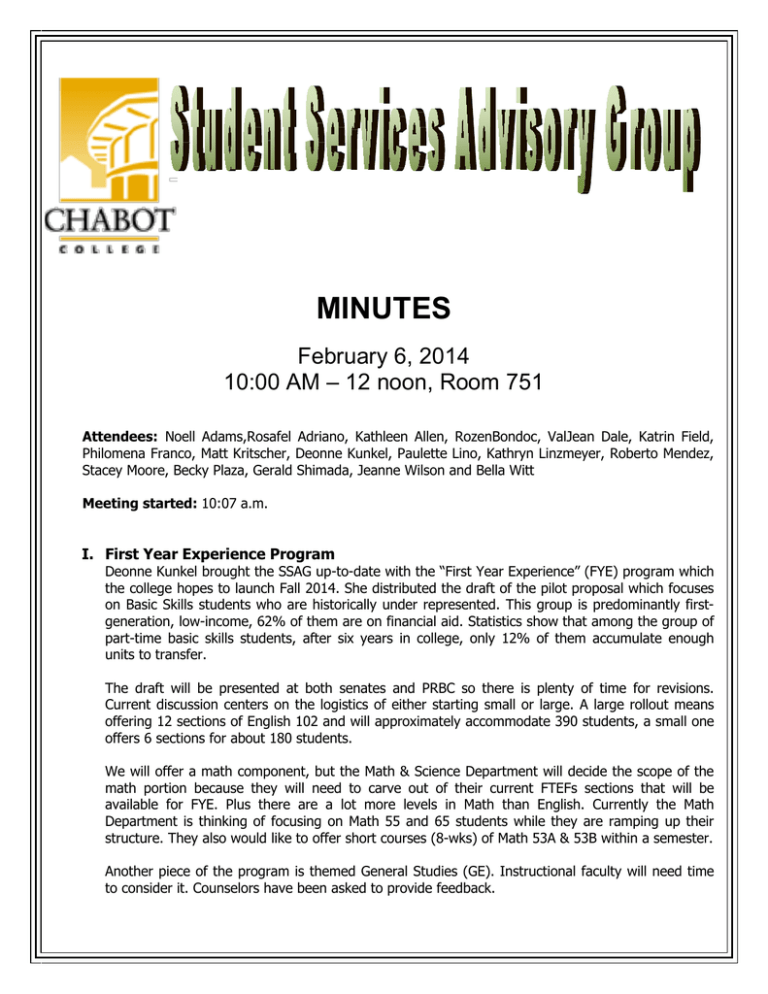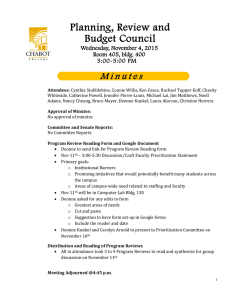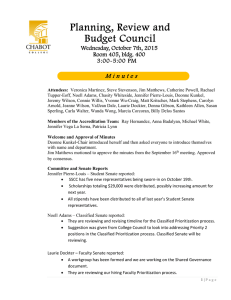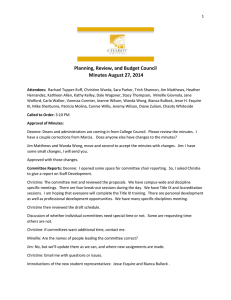MINUTES February 6, 2014 10:00 AM – 12 noon, Room 751
advertisement

MINUTES February 6, 2014 10:00 AM – 12 noon, Room 751 Attendees: Noell Adams,Rosafel Adriano, Kathleen Allen, RozenBondoc, ValJean Dale, Katrin Field, Philomena Franco, Matt Kritscher, Deonne Kunkel, Paulette Lino, Kathryn Linzmeyer, Roberto Mendez, Stacey Moore, Becky Plaza, Gerald Shimada, Jeanne Wilson and Bella Witt Meeting started: 10:07 a.m. I. First Year Experience Program Deonne Kunkel brought the SSAG up-to-date with the “First Year Experience” (FYE) program which the college hopes to launch Fall 2014. She distributed the draft of the pilot proposal which focuses on Basic Skills students who are historically under represented. This group is predominantly firstgeneration, low-income, 62% of them are on financial aid. Statistics show that among the group of part-time basic skills students, after six years in college, only 12% of them accumulate enough units to transfer. The draft will be presented at both senates and PRBC so there is plenty of time for revisions. Current discussion centers on the logistics of either starting small or large. A large rollout means offering 12 sections of English 102 and will approximately accommodate 390 students, a small one offers 6 sections for about 180 students. We will offer a math component, but the Math & Science Department will decide the scope of the math portion because they will need to carve out of their current FTEFs sections that will be available for FYE. Plus there are a lot more levels in Math than English. Currently the Math Department is thinking of focusing on Math 55 and 65 students while they are ramping up their structure. They also would like to offer short courses (8-wks) of Math 53A & 53B within a semester. Another piece of the program is themed General Studies (GE). Instructional faculty will need time to consider it. Counselors have been asked to provide feedback. Student Services Advisory Group Minutes for 2/6/14 2|P a g e Additional components include Peer Advisors attached to PSCN, GNST or themed GE courses, so students will have the advantage of forming communities and plan community engagement activities. There will also be tutors to lead study groups attached to Math courses. As an incentive for students, FYE proponents plan to ask funding from student government that would provide $25 gift certificate to program participants along with potential laptops and hotspots from Sprint. The college has to ascertain and prioritize its immediate needs for both the short term and long term so we can determine funding and ultimately ensure the success of the program. The long term priorities will be included in our Student Equity Plan. For example: • For all the work, the hiring packets and follow-up, of hiring more tutors and mentors for the Learning Connection, what would be the total hours needed and the number of staff support? • What would we need for financial aid? • What can we potentially coordinate with HSI? • More hours for the Transfer Center • How many hours do we need for Degree Works? • How many hours of staff support needed to register the students since we will be able to block-off these courses? It was suggested that the smaller version of the pilot be launched this Fall, and then ramp it up Spring 2015 when we have fewer students and less impact on services, so we can see where the bugs are. So by Fall 2015 we can ramp it up even higher because by then we will know the true cost of the program. Deonne said there are 3 areas on campus (Allied Health, STEM and Business) that would like FYE to be part of a longer pathway because they have the greatest roadblocks for students in completing a pathway. They would like time to develop a stronger class schedule. With regards to State funding, Deonne said that $100 million for SSSP (matriculation) has been set aside; another $100 million for colleges that are ready with their Student Equity Plan to build programs that exist. The Student Equity Plan has to be written by the end of this semester to give time for the Board to review and approve, and then submitted to the State by October 17th. Chabot’s FYE plan should be established by then, if not a full up and running program, but have components in place. Deonne concluded by stating that to her this project is not just about building a program, but changing/shifting the culture on campus so that students see themselves reflected in the curriculum and in the way the campus is organized. A suggestion was made to survey students to see their reaction on the FYE program and gather their ideas. Deonne said she will ask student government to create a survey. Kathleen Allen pointed out that many students may not be able to handle full-time class units or are ready for these classes. Counselors and Student Services as a whole must be part of the conversation when planning pathways. Student Services Advisory Group Minutes for 2/6/14 3|P a g e The Presidential Task Force meets tomorrow. A proposal has been forwarded to the Staff Development Committee to set time during Flex Day to discuss FYE. II. Campus Sexual Violence Elimination Act of 2013 ValJean Dale and Rosafel Adriano updated the group on the Campus SaVE Act, a new law that mandates higher education institutions to educate and train students and all campus personnel on the prevention of sexual violence on campus within the 2014-15 school year. The new law is designed to help institutions better protect their students and employees from sexual violence. And we have to show evidence to the State that training has been completed. ValJean said she is still in the fact-finding process. She has spoken to colleagues from other colleges and has contacted some training vendors. If we are to train all students and all employees, what would it take and who does it impact? As an example of cost, one company quoted $4.00 per student and $3.00 per faculty, staff and administration. She shared a couple of staggering recent statistics: 4,000 reported incidents of sexual battery and over 800 reported rapes and attempted rapes occurring in our nation’s public high schools; by the time girls graduate from high school, more than 1 in 10 will have been forced physically to have sexual intercourse. When young women get to college, nearly 20% of them will be victims of attempted or actual sexual assault, as will about 6% of undergraduate men. ValJean and Rosafel showed two videos by Catharis Productions. The first video called “Sex Signals-Sexual Assault Awareness Program” which used role play, comedy and audience participation that explored the issues of dating, sex and date rape. The second video was centered on “Bystander Intervention” which offered a personalized interactive experience. The group liked both videos and suggested: • Online training requirement • Campus activity for community building (i.e., activity during April which is Sexual Assault Awareness Month) • College may be able to create plays similar to video • Meeting and training sessions need to be gender specific so that audience will feel comfortable asking questions/concerns • Team-up with LPC to reduce cost; important that District takes the lead III. Other Business ---Director Paulette Lino handed out the proposed draft of the Summer-Fall 2014 Registration Dates. ---Director Kathyrn Linzmeyer distributed and went over the draft of the Feb 18-20 Flex Days schedule. Meeting Adjourned: 11:50 AM Next Meeting: March 6, 2014 in the Board Room BW Handouts --- First Year Experience Program (draft) --- Campus SaVE Act of 2013 Student Services Advisory Group Minutes for 2/6/14 4|P a g e ---Dialogue on SaVE Act --- Summer-Fall 2014 Registration Dates (proposed) --- Feb Flex Days Schedule (tentative)






